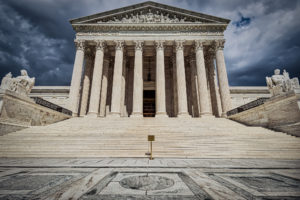
Justice Kavanaugh is sworn in, Supreme Court allows North Dakota’s voter ID law, and more…
IN THE NEWS
- After one of the most controversial confirmation processes in recent history, Justice Brett M. Kavanaugh was sworn in as an Associate Justice of the U.S. Supreme Court, replacing Justice Anthony M. Kennedy, who retired in July. Justice Kavanaugh’s first oral arguments included cases on mandatory detention of criminal aliens, statutory interpretation of burglary and robbery in the Armed Career Criminal Act, and product liability under maritime law for asbestos-related injuries to sailors.
- In a 6-2 vote, the U.S. Supreme Court allowed North Dakota’s voter identification law, whose challengers said it would disenfranchise Native American voters, to go into effect for the upcoming midterm elections. The Court declined to explain its reasoning for rejecting the challengers’ request to restore an order by the U.S. District Court for the District of North Dakota striking parts of the law. Justice Ruth Bader Ginsburg dissented, writing that the law creates a “large” risk of disenfranchisement.
- Justice Ginsburg, who oversees the U.S. Court of Appeals for the Second Circuit, allowed Secretary of Commerce Wilbur Ross to be deposed in litigation over the legality of the U.S. Census Bureau’s request to include a citizenship question on the 2020 census. This ruling followed an appeal filed by U.S. Solicitor General Noel Francisco arguing that Ross does not need to testify. In September, the U.S. District Court for the Southern District of New York ruled that Ross must sit for a deposition because his “intent and credibility are directly at issue.”
- The U.S. Food and Drug Administration (FDA) revoked its approval of six synthetic food additives in response to a petition from several organizations. The petition cited multiple studies demonstrating that the additives “induce cancer in man or animal.” FDA stated that although “rigorous scientific analysis” showed the additives were safe at the levels used in food, the Delaney Clause of the Federal Food, Drug, and Cosmetic Act prohibits FDA from approving any carcinogenic food additive. According to FDA, companies have 24 months to reformulate any food products that contain the additives.
- The Trump Administration ordered the U.S. Environmental Protection Agency (EPA) to “expand” sales of ethanol. The plan would allow year-round sales of gasoline with 15 percent ethanol content, even though the Clean Air Act currently prohibits sales during the summer. President Donald Trump stated that the plan would have “no negative impact,” but Chet Thompson, president of American Fuel and Petrochemical Manufacturers, a group representing fuel refiners, described the plan as “unlawful.”
- In a 99-1 vote, the U.S. Senate approved the America’s Water Infrastructure Act of 2018. Senator John Barrasso (R-Wyo.), Chairman of the Senate Committee on Environment and Public Works, stated that the “bipartisan legislation” would “cut Washington red tape, grow the nation’s economy, and help keep communities safe.” The bill now only requires President Trump’s signature to become law.
- U.S. Secretary of the Interior Ryan Zinke announced a 20-year mining ban on 30,000 acres of land in Montana’s Paradise Valley near Yellowstone National Park. Secretary Zinke stated that Paradise Valley was not an appropriate place for mining, noting the “world-class hunting, fishing, tourism and recreation economy” in the region.
- FDA expanded the approval of the Gardasil 9 vaccine to include men and women aged 27 through 45. Gardasil 9 “prevents cancers and diseases caused by the nine HPV types covered by the vaccine” and previously was approved only for males and females aged 9 through 26.
- The United Kingdom’s Competition and Markets Authority (CMA) launched an investigation into whether the audit sector “is competitive and resilient enough to maintain high quality standards.” Part of the investigation will focus on whether the “big four” auditors—Deloitte, KPMG, Ernst & Young, and PricewaterhouseCoopers—are “too big to fail.” In a letter to Secretary of State for Business, Energy and Industrial Strategy Greg Clark, CMA Chair Lord Andrew Tyrie wrote that “potential remedies…would be likely to require legislation.”
WHAT WE’RE READING THIS WEEK
- The Federal Communications Commission’s repeal of net neutrality has serious implications for online sports broadcasting, wrote Mark A. Conrad of the Fordham University Gabelli School of Business in a forthcoming article for the Journal of Legal Aspects of Sport. Conrad expressed concern about possible tension between sports leagues, broadcasters, and viewers, noting the potential for “‘slowing’ disfavored sports content,” or “paid prioritization” of one sport over another. Although it is uncertain what approaches broadcasters will take without net neutrality rules, Conrad concluded that internet service providers “can call the shots” and that they will have the most control over “content, speed and priority” of online sports broadcasts.
- China has avoided the financial instability that typically follows rapid financial system growth, but the country may be headed toward a crisis, wrote Logan Wright and Daniel Rosen in a Center for Strategic and International Studies report. They argue that China has evaded a financial crisis through its high national savings and low levels of external debt, which in the past has given it flexibility to reallocate resources when the financial system is stressed. But as economic growth slows while consumer demands increase, Chinese regulators may have to allow risky financial practices to meet the challenge, increasing the chance of crisis, according to Wright and Rosen.
- Small and medium businesses are at the forefront of environmental protection efforts in Nigeria and Ghana, according to a joint paper by Uchenna Efobi, Opeyemi Akinyemi, and Ibukun Beecroft of Covenant University, Emmanuel Orkoh of North-West University, Scholastica Ngozi Atata of Federal University of Agriculture, and Tanankem Belmondo of Cameroon’s Ministry of Economy, Planning, and Regional Development. Efobi and his coauthors stated that small and medium businesses tend to be “more environmentally conscious” despite facing higher financial burdens because they bear “direct accountability to the community” in which they operate. They recommended that regulators create financial incentives for small businesses to capitalize on their desire to operate sustainably.



